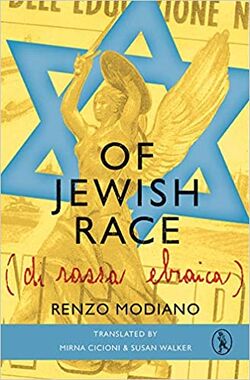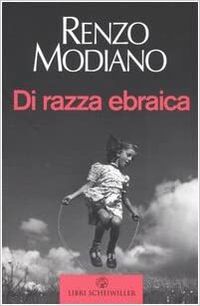Renzo Modiano (M / Italy, 1936), Holocaust survivor
Renzo Modiano (M / Italy, 1936), Holocaust survivor
- KEYWORDS : <Hidden Children>
- MEMOIRS : Of Jewish Race (2005)
Biography
Renzo Modiano was born in Rome in 1936. By the time he went to school in 1942, Jewish children were separated from the others, and the words, "Of Jewish race", appeared in red after his name on his school report. In October 1943, he started the nine months on the run from the Nazi-Fascist authorities that are the subject of this book. Following the Liberation, he completed his education and graduated in Political Science from the Sapienza University in Rome. He worked as a journalist and on computer technology, but eventually decided that he was more interested in people than in bytes. He became a manager in the personnel department at Olivetti, and then the director of human resources at Mondadori. He is the author of four novels and the winner of the Dino del Bo literary prize. In 2006 he also won the Ultima Frontiera literary prize for Of Jewish Race, which is now also published in an edition for the Italian schools. He continues to work as a consultant, teacher and writer.
Book : Of Jewish Race (2005)
Renzo Modiano, Di razza ebraica (Milano: Libri Scheiwiller, 2005)
English. ed. Of Jewish Race (Vagabond Voices, 2013)
"Renzo's story is a neglected fragment of the Holocaust. Evading the horrors of death camps and gas chambers, he tells of the Jews' everyday scramble for survival in Nazi-occupied Italy. It is the story of a young boy on the run, gradually acclimating to an unthinkable reality. But the story is not without glimpses of hope and joy. In rural Italy a communal meal provides a lesson in humanity he never forgets; the bravery and sacrifices of family, friends, and strangers affect him in profound ways. Told with spontaneity and charming honesty, this is a vivid memoir that offers a different perspective on the Jewish plight, showing us just how perceptive naive eyes can be."--Publisher description.
Review, by Sara Valentina Di Palma
A sette anni non ancora compiuti, Renzo scopre che l’8 settembre 1943 non significa fine della guerra in senso tradizionale, ma inizio di nuovi pericoli per gli ebrei. Nascosto in Abruzzo (a Civitatomassa) presso conoscenti della famiglia, Renzo trascorre con il fratello Guido un autunno campagnolo relativamente sereno, turbato dalla mancanza di notizie dei genitori, fino a quando un altro conoscente del padre va a prendere i due bambini. Insieme al fratello e poi da solo, Renzo è costretto a cambiare continuamente nascondiglio per ragioni di sicurezza. Lasciare la campagna abruzzese significa anche, per il bambino, perdere compagni di giochi e una vita spartana ma libera: a Roma è costretto a restare sempre in casa e può sgattaiolare fuori raramente per non essere visto dalla portinaia del palazzo.
La testimonianza dà particolare rilievo al senso di ingiustizia per non poter vivere insieme alla madre e al padre, che vivono altrove, cui si aggiungono la gelosia per il fratello quando questi viene nascosto con i genitori e il dolore per la perdita dell’amato zio, di cui non si hanno notizie ma che il bambino intuisce essere morto, perché “I tedeschi prendono gli ebrei” (p. 83).
Nel marzo 1944 Renzo riesce ad ottenere di essere nascosto con i genitori e con Guido; perché la famiglia sia riunita manca ora solo la sorella Elena, cui il bambino può fare solo rare e veloci visite.
La liberazione, invece, occupa poche pagine e corrisponde, secondo l’autore, ad un rapido accelerarsi dei ricordi, che tra l’8 settembre 1943 e il 5 giugno 1944 si sono impressi come in fotogrammi e in “istantanee” (p. 115), in una parentesi vorticosa e traumatica.

